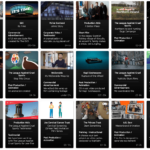You may not know it, but there are lots of opportunities out there for brands to get together and make video content that can increase your potential to succeed in today’s marketplace. If you’re offered a sponsorship deal you may think its a no-brainer and jump straight in before thinking it through. The truth is, there are important considerations to be made before you sign yourself up to a deal. Read on for some impartial advice from us at Production Attic…
THE PROS
Free products
Let’s just be honest, the prospect of getting free products can be a deal breaker when deciding whether to create content for a sponsored video. Apart from the fact that we all love a freebie, there are genuine considerations to be made. For example, is the product yet to be released to the general public? If so, your video will have valuable information that consumers might be excited to know about. If you can get a video online sharing your thoughts and experiences on the product before anyone else, you will have a better chance of appearing higher in any search results for the product, getting you more views and possible clicks through to your website.
Similarly, the product may be readily available but simply out of reach to you personally, and it might benefit your business to have the product to use on a day to day basis. For example, a makeup artist may be offered a set of brushes that are only release in Asia. It’s still viable that they could make a video using these brushes, showing how to create looks which can be used with similar brushes available in the UK, whilst benefitting from adding the product to their toolkit.
FREE GUIDE: 5 Types of Video to Improve Your Business
Exposure
Depending on the nature of the deal you do with your sponsor, you may benefit from good exposure as a result. Some people will happily accept cash as payment for featuring a brand or product in a video (and this should always be disclosed at the start), but you may want to think long term and gain some coverage for your business. If the brand has a big following online you could agree that they share your video via social networking for a few weeks, or maybe some sort of advertising on their website. You could even ask them to make a video featuring your brand or product in exchange.
May improve your brand
As a growing business, you may still be finding your feet with regards to your ‘brand image’ and all that jazz. A good way to build up a positive image is to affiliate yourself with companies which have a brand style you would like your business to emulate. For example, if you are a home baker, you may want to do a video sponsored by your local organic farm shop to support the notion that you only use premium ingredients in your baking.
Chance of ongoing affiliation
If your first sponsored video is a success, you may have the chance of getting a contract to have an ongoing affiliation with the brand. This could potentially act as a regular source of income for your business, as well as a way to drive sales. It could open up doors to new ventures, meeting other industry professionals, potential employees, business expansion and give customers confidence in your brand as a whole.
THE CONS
Pressure to produce content
Once you’ve agreed to create a sponsored video, you may find PR people begin to hound you to find out exactly when this video is going to be produced. They may also try to dictate when and how the video is shared online, to coincide with any other marketing material they plan on using. Any specific requests or deadlines should be agreed upon at the start and you shouldn’t feel under pressure to produce content in an unrealistic timeframe, especially if no payment is involved and you are actually doing them a favour.
Pressure to give false reviews
Its definitely a good idea to explain to brands that you cannot guarantee positive comments in your sponsored video. Although it seems rude to accept free products and then slate the brand in a video, you still must consider your own reputation and what you want to communicate to your customers. You should never feel under pressure to make false claims about a product, in fact there are strict guidelines set out by the Advertising Standards Authority which can be read in full at www.asa.org.uk
Consumers may question your authenticity
The final point here is probably the most important – is your viewer going to question your motives for making a sponsored video? Modern consumers are not stupid and they can spot product placement a mile off. Ultimately, you have to determine whether the way you handle the sponsored content is authentic, honest and genuine instead of contrived and off-putting. We suggest you start by being completely open and explain either in the video or via a disclaimer at the beginning what the nature of your video is with regards to sponsorship. You should also ensure your review of the product is realistic and talks about any obvious problems or faults it may have instead of trying to flog something you now isn’t up to scratch.










